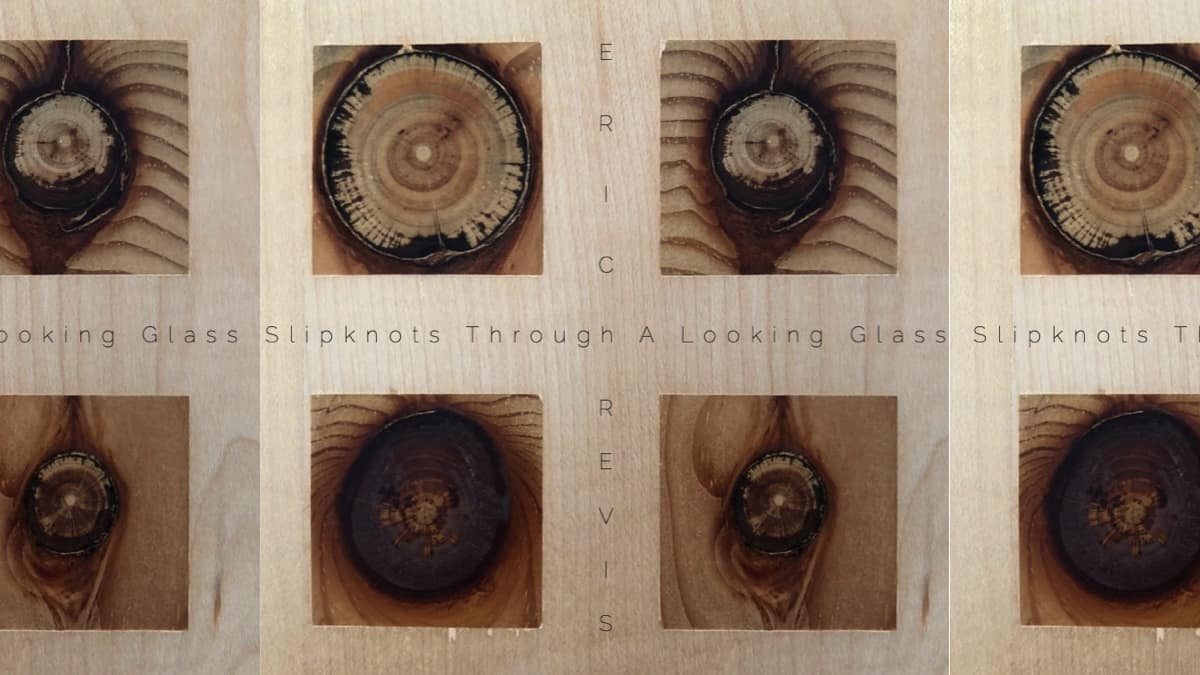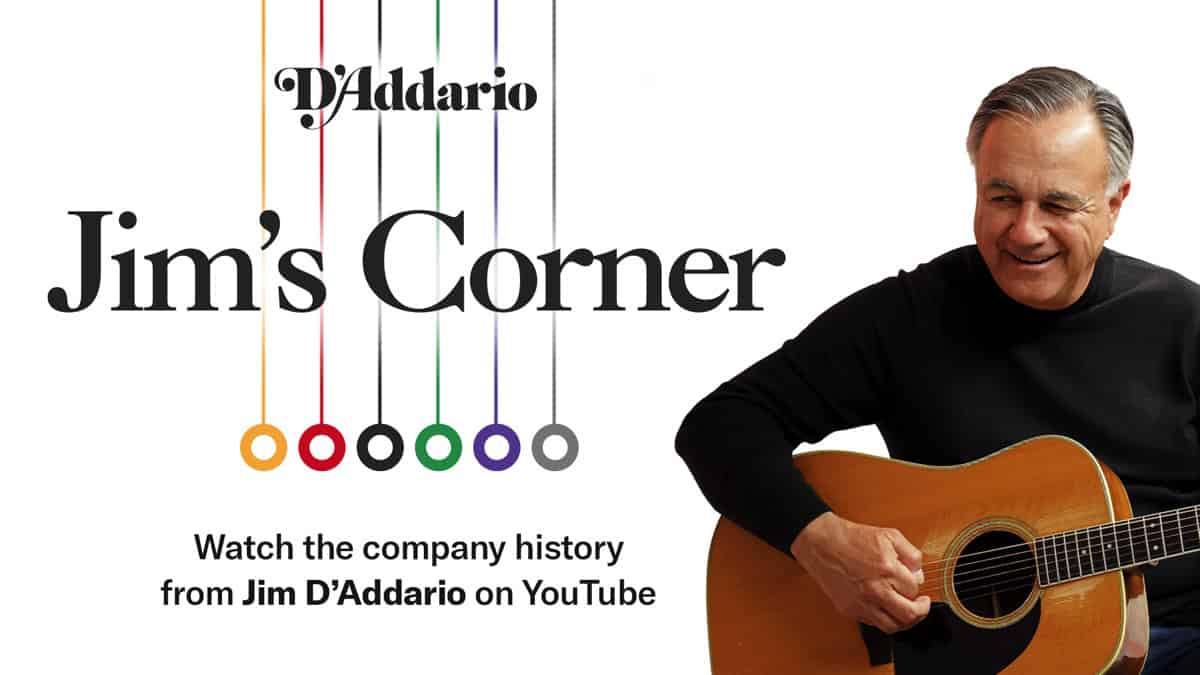Latest
Eric Revis: Slipknots Through A Looking Glass

Eric Revis flexes conceptual sensitivity with the release of Slipknots Through A Looking Glass.
Slipknots Through A Looking Glass…
A highly skilled master of sound and sense, GRAMMY award-winning bassist and composer Eric Revis has crafted his artistic legacy around asking the same question again and again: Why not? Experimenting remains integral to his expression. Over the years, the critically-acclaimed artist’s willingness to traverse the unknown has prompted collaborative partnerships with Branford Marsalis, Nasheet Waits, Kris Davis, Peter Brötzmann and Jason Moran.
Heralded by critics as “powerful,” “raw” and “fierce,” Revis’ playing frequently becomes mischaracterized by way of omission.
While he plays and composes with master-level intensity, the intrinsic vulnerability present in any form of experimenting — and deeply present in Revis’ artistry — rarely yields recognition among music writers. “I don’t mind those kinds of descriptions or monikers,” he says, “but not when it’s at the negation of everything else. There may be an air of robustness around my music, but there is a lot of sensitivity and intellectual content.”
Poised to challenge those limited views of Revis’ expression, Slipknots Through a Looking Glass — his eighth solo-led album, and first release on Pyroclastic Records — explores new territory alongside familiar travelers: drummer Chad Taylor, pianist Kris Davis and saxophone masters Darius Jones and Bill McHenry. “The band is kind of an amalgam of groups I’ve previously recorded with,” says Revis, who sought to combine the energies of various project iterations on a single record.
Much of the album’s music — primed for enquiry and collaborative input — emerged during several weeks of solitude. Through a partnership with The Jazz Gallery, the LA native received a 2017 grant from The Rockefeller Foundation to spend some time at the Kykuit estate in Pocantino Hills, NY. Two compositions from that retreat found their way on to Marsalis’ 2019 GRAMMY-nominated recording The Secret Between the Shadow and the Soul. Revis sought to interpret the remaining music through a range of treatments — both scripted and spontaneous — on Slipknots Through a Looking Glass, an album that exposes the full flower of his conceptualism. Master producer Ron St. Germain serves as production and mixing engineer for the recording – an instrumental force in the development of its character, at once sprawling and intimate.
Beginning as a developing conversation between Revis and Taylor, “House of Leaves” represents a conceptual flex for Revis as a composer.
The track centers around textural shapes — each, according to Revis, its own island. Exploiting space, the artists leave one island and reenter “nothingness” before traveling to the next. “It was interesting to see how the band could collectively navigate these islands,” says Revis. “Without giving it over to the musicians entirely, the process was more, ‘I have this sparse idea; let’s develop it into this next sparse idea, and then go on from there.’”
Rendered as a “visceral approach to melody,” according to Revis, “Vimen” serves the artist’s appetite for exploring energies that surround the music — and the session — thoroughly and critically. “I wanted more emphasis on the energy than on exact notes or notation,” he says. He asked his collaborators to approach title track “SpÆ” with similar controlled spontaneity. “We kind of deconstructed the composition,” says Revis. The trio tune features Davis on prepared piano and Taylor on mbira. “We just played,” he says.
Incorporating three separate takes, the track features crossfades leading from one take to the next. “It’s almost like if you had people speaking in three separate rooms, and then you put them together — all of a sudden you have this great conversation that, even though it was intended to be about disparate things, really makes a whole lot of sense.”
An artist fascinated by the surrealist movement, Revis keeps a digital journal of images and concepts flashing before him so that he might one day use them in his music.
“The image of slipknots through a looking glass came up and I thought, ‘Wow — this is really cool.’” Immediately he connected his own artistry to the image’s inherent symbolism: the slipknot’s ephemeral nature further complicated by its reflection through the looking glass — was it even there to begin with, and where does it go when it disappears? “All those ideas are very, very much a part of this record,” he says. “The idea of a journey — although it wasn’t something that I set out to do, it’s a theme that runs through all of this record.”
How listeners might interpret his music matters less to Revis than the act of composing and recording it. “We can hear things and say, ‘Wow, I feel a certain foreboding quality about this,’ and the next person says, ‘Wow, this is such a happy song,’ or for example, Tchaikovsky being able to evoke all this emotional gravitas and almost melancholy — out of major chords! He’s able to exact pathos from major chords.”
“Hopefully, it’ll be heard,” he says. “When somebody really doesn’t like something, I think that’s incredibly honest and beneficial. If [my music] truly evokes real happiness, that is absolutely beautiful. But if it makes you uncomfortable, that’s a real emotion. And to have something do that — I think that that’s amazing.”
Visit online at ericrevis.com
Gear News
Gear News: Positive Grid Launches Spark 2

Positive Grid launches Spark 2, the next evolution of their cutting-edge smart guitar practice amplifiers and Bluetooth® speakers.
Engineered for acoustic, electric guitar, and bass, Spark 2 delivers an immersive practice and playing experience. Enjoy detailed sound and an all-new upgraded speaker design powered by Positive Grid’s exclusive Sonic IQ Computational Audio technology. With an onboard creative looper, optional battery power, and intuitive AI features for tone exploration and practice, Spark 2 is the gateway to a musical experience that goes beyond expectations.
Proprietary Audio and Advanced Technology
Spark 2 represents a leap forward in amplifier design. It integrates a new DSP amp modeling engine with double the processing power, and at 50 Watts, it packs 25% more volume than the original. Positive Grid’s proprietary Sonic IQ Computational Audio delivers incredibly detailed and dynamic sound. New HD amp models, enhanced by multi-band dynamic range compression and virtual bass augmentation, redefine the sonic landscape.
Equipped with two premium FRFR speakers and reflex ports, Spark 2 offers wide stereo imaging and broader frequency response, ensuring refined bass and clear, immersive sound.
Built-In Creative Looper
Spark 2’s built-in Groove Looper features hundreds of hyper-realistic drum tracks. From basic loops to multi-layered soundscapes or the ultimate jam session, this intuitive tool inspires endless creativity. Onboard amp controls provide quick, on-the-go looping functionality.
AI-Powered Tone and Smart Jam
Spark AI revolutionizes tone exploration. Describe any desired tone in the Spark app – from practical to outlandish – and Spark AI will suggest tones to audition or download. The more it’s used, the smarter it gets, delivering the perfect sound.
Additional smart features make it easy to practice, learn new songs and improve playing skills. Smart Jam listens to the user’s playing style and generates accompanying bass and drum parts, while Auto Chords analyzes any song streamed and displays the guitar chords in real time, to make learning and practicing new songs easier than ever.
Enhanced Hardware Design and Portability
Spark 2 allows for storing up to eight customizable presets directly on the amp for quick access to favorite sounds. Perfect the tone with large, visible onboard controls for looper, EQ, gain, reverb, and more.
Designed for convenience, an optional rechargeable battery provides up to 12 hours of playtime for on-the-go sessions. The new double-thick strap and durable build ensure easy and secure transport. Spark 2 is also Bluetooth® ready, allowing for music streaming and jamming along with favorite tracks anytime, anywhere.
Multiple Outputs and Advanced Features
Spark 2 offers versatile connectivity with a headphone out for private practice, stereo line outs for external audio sources, and a USB-C port which enables it to function as an audio interface. WiFi-enabled, Spark 2 allows convenient over-the-air firmware updates, keeping the amp up to date with the latest features and improvements.
“I’ve used a ton of practice amps while touring the world for over 38 years and it was always just a technical, bland exercise,” says guitar virtuoso, singer-songwriter and producer Nuno Bettencourt. “Spark 2 is like taking Madison Square Garden wherever you go – epic and versatile.”
Color Options
Available in Pearl or Black finish with a dark weave grille and premium finish.
Special Event, Upgrade Pricing & Availability
Join the special live premiere event featuring Nuno Bettencourt and surprise guests on August 1, 2024, at 8:00 am PT/11:00 am ET. Visit positivegrid.com/pages/livestream for more details and to sign up for a reminder.
Regularly USD $299, Spark 2 will be available at special early bird pricing during the pre-order period. Registered Spark 40 owners can also receive exclusive upgrade pricing.
For more information and to sign up for pre-order alerts, visit positivegrid.com/products/spark-2.
Gear Reviews
Gear Review: Exploring the Joyo Gloam – Sub Octave Fuzz Pedal for Bass

A review of the Joyo Gloam – Sub Octave Fuzz Pedal for Bass
Disclaimer: This pedal was kindly provided by Joyo for the purpose of this review. However, this does not influence our opinions or the content of our reviews. We strive to provide honest, unbiased, and accurate assessments to ensure that our readers receive truthful and helpful information.
Introduction: The Joyo Gloam is a sub-octave fuzz pedal specifically designed for bass players, combining modern sub-octave effects with rich fuzz tones. With two independently controlled circuits, the Gloam aims to provide a versatile range of sounds, from deep, aggressive fuzz to Moog-like synth effects. This review will explore the Gloam’s specifications, controls, and overall performance, highlighting both its strengths and areas for improvement.
Specifications:
- Dimensions: 130 * 110 * 50 mm
- Weight: 403g
- Working Voltage: DC 9V
- Controls: The Joyo Gloam features a comprehensive control set designed to provide bassists with a wide range of tonal options:
- Dry Tone: Adjusts the tone of the clean signal.
- Dry Volume: Controls the volume of the clean signal.
- Sub Octave Volume: Adjusts the volume of the sub octave signal.
- Gain: Controls the amount of gain in the fuzz circuit.
- Fuzz: Adjusts the intensity of the fuzz effect.
- Bass: Controls the bass frequencies in the fuzz circuit.
- Treble: Adjusts the treble frequencies in the fuzz circuit.
- Fuzz Mode Switch: Switches between two different fuzz modes.
- Dry Tone Frequency Switch: Selects between two different frequency points for the dry tone.
Performance: The Joyo Gloam excels in its dual-circuit design, offering both a sub octave and a fuzz channel that can be controlled individually. However, it’s important to note that the octaver cannot be used without the fuzz circuit activated; the only way to solo the octaver is by turning down the fuzz while both channels are engaged.
Fuzz Circuit: The fuzz circuit includes standard controls such as gain, volume, bass, and treble, along with a fuzz mode switch that toggles between two distinct fuzz modes. While one of the fuzz modes is highly usable and delivers a rich, aggressive tone, the other mode falls short and is less practical for most applications.
Octaver Circuit: The octaver circuit features controls for sub octave volume, clean volume, and clean tone, along with a dry tone frequency switch that provides two different frequency options. This allows for significant tonal versatility, enabling bassists to fine-tune their sound to match their preferences. Despite its limitation of being tied to the fuzz circuit, the octaver produces a deep, balanced sound that stands out.
Combined Effect: When used together, the fuzz and octaver circuits create a wide range of sounds, from classic, aggressive fuzz to synth-like tones reminiscent of a Moog synthesizer. This combination makes the Gloam a powerful tool for bassists seeking to experiment with their sound and achieve unique, textured tones.
Pros:
- Versatile Controls: Extensive control options for both fuzz and octaver circuits.
- Rich Tones: Delivers deep, aggressive fuzz and balanced octaver sounds.
- Sturdy Construction: Durable build quality ensures reliability.
- Wide Range of Sounds: Capable of producing everything from classic fuzz to synth-like effects.
Cons:
- Unusable Fuzz Mode: One of the fuzz modes is less practical.
- Dependent Octaver: Octaver cannot be used independently of the fuzz circuit.
Conclusion: In conclusion, the Joyo Gloam sub-octave fuzz pedal offers a versatile and powerful option for bassists looking to expand their tonal palette. Despite some flaws, the Gloam delivers impressive sounds and flexibility. Its combination of rich fuzz and deep octaver tones, coupled with a sturdy construction, makes it a valuable addition to any bassist’s pedalboard. For those seeking a modern bass distortion with the added depth of sub-octave effects, the Joyo Gloam is a compelling choice for a very compelling price.
Visit online at joyoaudio.com/product/281.html
Latest
July 22 Edition – This Week’s Top 10 Basses on Instagram

Check out our top 10 favorite basses on Instagram this week…
Click to follow Bass Musician on Instagram @bassmusicianmag
FEATURED @jermsbass @ramabass.ok @adamovicbasses @mgbassguitars @marleaux_bassguitars @overwaterbasses @mauriziouberbasses @elrickbasses @zemaitisguitars @sandbergguitars
Gear News
Behind the Strings: D’Addario’s Story Comes to Life in “Jim’s Corner” YouTube Series

Behind the Strings – Jim’s Corner…
D’Addario & Co. proudly announces the launch of “Jim’s Corner,” a captivating new YouTube series telling the 400-year-old story of the D’Addario family creating the world’s largest music accessories company. This series features Jim D’Addario, Founder and Director of Innovation at D’Addario and Co., sharing his family’s remarkable journey from 17th century Italy to a 21st century global enterprise.
In the first four episodes now available, Jim D’Addario takes viewers back to the beginning, making strings from animal guts and knotting ukulele wire as a family around the television. Countless generations carried the passion forward until the 1970s when the company made it official and never looked back. Jim recounts the creation of strings that inspired legendary riffs, including one by The Who, the launch of Darco strings, the merger with Martin Guitars and the company’s humble beginnings with his wife, Janet and brother, John. Jim D’Addario’s firsthand accounts provide an intimate and personal perspective on the milestones and challenges that shaped D’Addario into the revered brand it is today.
Episode Highlights:
- Episode 1: The Early Days in Italy and the Move to America
- Episode 2: Inspiring Iconic Riffs and Legendary Partnerships
- Episode 3: Launching Darco Strings and Merging with Martin Guitars
- Episode 4: Building the D’Addario and Co. Legacy
Watch & Subscribe Now:
Join us in celebrating this incredible legacy by watching the first four episodes of “Jim’s Corner” on YouTube. New episodes will drop every month so please subscribe to our channel to ensure you don’t miss any future episodes and exclusive content from D’Addario & Co.: www.youtube.com/@daddarioandco
Gear News
Gear News: Aguilar Amplification Unveils Limited Edition NYC Gold Skyline Tone Hammer Preamp

Aguilar Amplification announces the release of the Limited Edition NYC Gold Skyline Tone Hammer Preamp pedal. Hand serialized 1-100, this exclusive edition celebrates Aguilar’s deep roots in New York City with a tribute to its iconic landmarks and vibrant spirit.
Born in the heart of NYC and raised on the road, the Tone Hammer Preamp DI has been an indispensable tool for bassists seeking inspiring tone and versatility. The new Limited Edition Gold NYC builds on this legacy with striking custom graphics encapsulating the essence of New York City. Featuring iconic landmarks from the Statue of Liberty to the Empire State Building, this pedal is not just a tool, but a piece of art embodying the soul of the city. Each unit features a sharp platinum silkscreen over a stunning matte gold sparkle finish, that is as visually captivating as it is sonically powerful.
The Tone Hammer is an essential preamp/direct box for every bassist’s toolbox. The Tone Hammer features fully sweepable midrange frequencies in addition to bass and treble controls. With the Tone Hammer’s pristine D.I. players are set for either studio or stage. To give this tone shaping unit the ultimate flexibility we introduce our proprietary Adaptive Gain Shaping circuitry (AGS). AGS allows the player to kick in an additional gain structure and EQ with the “stomp” of a button. You can go from modern slap sounds to vintage or overdriven. 18-volt operation gives the Tone Hammer plenty of headroom to reproduce the most dynamic playing styles. Separate gain and master controls allow players to dial in just the right gain structure for any instrument.
Aguilar Amplification’s Jordan Cortese adds, “With only 100 hand-numbered units available, this third iteration of our NYC edition Tone Hammer is a collector’s dream. “It’s a homage to our city’s monumental influence on music and culture and celebrates the craftsmanship and the story of Aguilar”.
Street price: $299.99 For more information, please visit www.aguilaramp.com



